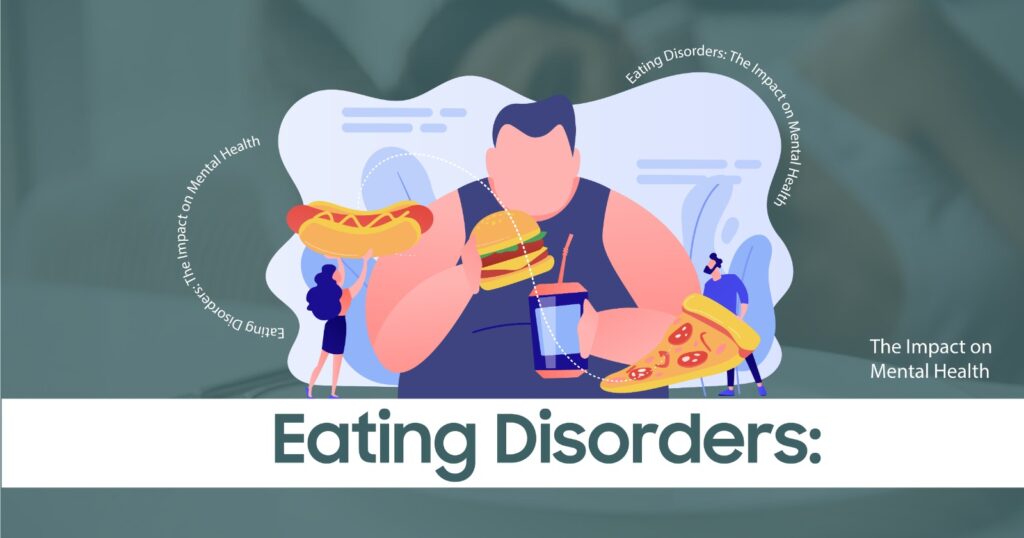Eating disorders are complicated and are most often not genuinely understood as mental disorders, which affect millions of people worldwide. These are not merely the root cause but the reliever of emotional hardships such as self-esteem issues, body image problems, and psychological distress.
They are closely interconnected with the further understanding of how eating disorders affect mental health and how critical these eating disorder treatments are related to recovery.
This blog discusses the different individual forms of eating disorders, together with their symptoms, since they mostly affect an individual’s mental wellness. A comparison between the treatment of anorexia and bulimia will follow along with how treatment will facilitate recovery.
What Are Eating Disorders?
Eating disorders are extreme mental health issues that are unhealthy, chronic eating behaviors that mainly result from severe physical, psychological, and emotional impacts.
The blame for eating disorders is directed towards genes, biology, environment, and consciousness. Mostly, eating disorders lead a person into some distorted relationship with food, which brings about a lot of dissatisfaction with their body image and weight.
Though often associated with females, eating disorders do manifest in people of all ages, sexes, races, and ethnic backgrounds. They can have disastrous outcomes, even death, if not treated, so making the need for early intervention and treatment of eating disorders is essential for recovery from the condition.

Who Is at Risk for Eating Disorders?
Eating disorders can affect anyone, but certain factors increase the risk of developing one. These include:
- Genetics. Genetics does increase the vulnerability of an eating disorder, especially if a complicated history of eating disorders, as well as mental health issues, runs in the family.
- Societal Pressure. The fashion and entertainment industries’ introduction of the “ideal” body type might contribute to body image concerns.
- Trauma or Abuse. Past events of any kind of abuse, whether physical, emotional, or something related, can very well set up eating disorder treatments as the coping mechanism.
- Psychological Issues. The suffering of anxiety, depression, or obsessive-compulsive disorder (OCD) could lead people to develop an eating disorder.
Recognizing the early signs can help prevent complications from developing, and treatment for an eating disorder may be a lifesaver.
What Are the Common Types of Eating Disorders?
The four most common eating disorders include:
Anorexia Nervosa
People who are coupled with a never-ending desire, along with cryptic and crazy fears usually assume that they have gained weight due to their eating activity. Or they can exercise for inexplicable hours.
Bulimia Nervosa
This is an eating disorder characterized by episodes of binge eating, followed by compensatory behaviors that could include making oneself sick, extensive exercise, or misusing laxatives.
Binge Eating Disorder (BED)
Binge eaters consume a much larger amount of food over time compared to an average person, so much so that this kind of behavior becomes maladaptive or abnormal.
Avoidant Restrictive Food Intake Disorder (ARFID)
This is an eating disorder where individuals tend to restrict nutrition based on fear or distaste or loss of interest in foods, resulting in deficiency and weight loss. Such an eating problem can be cured by therapy and nutritional help.
What Are the Signs and Symptoms of Anorexia Nervosa?
Among eating disorders, anorexia is one of the most severe conditions, revealing itself mainly as self-imposed starvation and extreme fear of gaining weight. In “anorexia nervosa,” as it’s termed, there is usually some association between standards in perfectionism and blocks of low self-worth, distortion of body image, and finally, the idea that one “is fat.”

Signs and Symptoms of Anorexia Nervosa Include:
- Excessive loss of weight or failure to gain as anticipated.
- Extremely obsessed with food, dieting, and body image.
- An intense fear of gaining weight, even while being underweight.
- Illusionary views about the body make it appear to be overweight when one is underweight.
- Restrictive eating or very rigid dieting behaviors.
- Excessive exercise or laxative use is used to avoid weight gain.
In the case you or someone near and dear to you is diagnosed with anorexia, the first step in delivering recovery and improving health as a whole would be looking up different treatment options available for anorexia.
What Are the Signs and Symptoms of Binge Eating Disorder?
Binge Eating Disorder is the most common form of eating disorder in America. It is when a person repeatedly eats more than the average pace at which most people eat without feeling a lack of control.
Unlike bulimia nervosa, those with Binge Eating Disorder do not purge themselves after binge eating. This can lead to obesity as well as cause depression, anxiety, and other medical-related problems in the body.
Symptoms of Binge Eating Disorder Include:
- Consumers gorge themselves on food even when they are not hungry.
- They feel like they have lost complete control of their binge eating episodes.
- Eating secretly or by themselves due to guilt or embarrassment.
- Feeling upset, sorrowful, or guilty after binge eating.
- Eating excessively until full.
Persons who have such symptoms or those who know individuals like them should consider getting treatment or Binge Eating Disorder Therapy because this would be extremely useful in the provision of treatment and intervention towards managing that disorder while still on the journey to recovery.
What Are the Signs and Symptoms of Bulimia Nervosa?
Bulimia nervosa is a disorder characterized by binge eating regularly, and then some form of purging or compensation is done after binges, such as the use of laxatives, high exercise, or starving oneself. Like anorexia, this condition generally presents in people who are of average weight and often experience weight changes.
Symptoms of Bulimia Nervosa include:
- Binging, or large quantities of food being consumed within a very short period.
- Purging behavior after eating, bingeing, vomiting, laxatives, exercise.
- An obsession with weight, body image, and dieting.
- Eating alone with purposing secretive behaviors.
- Evidence of purging may include tooth decay, swollen glands, or laxative abuse.
An individual will not find bulimia treatment even when learning to counter the effects incurred by bulimia nervosa. The treatment is only possible in an individual through which they will get an opportunity to develop a healthy approach towards what will be consumed and towards an emotional mindset.
What Are the Signs and Symptoms of Avoidant Restrictive Food Intake Disorder (ARFID)?
It is a pretty new diagnosis with an additional feature, that is, avoiding food severely based on dislike of its appearance, texture, or taste. Unlike other eating disorders, in the case of ARFID, there is no obsession with weight or body image. This may be associated with severe nutritional deficiencies and overall health implications.
Signs and Symptoms of ARFID Include:
- Avoiding certain foods due to their taste, smell, or texture.
- Having a hard time eating at a social gathering or mealtime.
- Excellent weight loss or not adding any weight.
- Nutritional deficiencies include low levels of iron or vitamins.
- They have very little variety in their foods and will not try anything new.
For individuals diagnosed with ARFID, eating disorder recovery support is essential in helping them overcome food aversions and ensure proper nutritional intake.
What Mental Illnesses Can Co-occur With Eating Disorders?
Concern about eating disorders is that they never exist only as a single entity but most often co-occur with one or more of the following:
Anxiety Disorders
Generalized anxiety, obsessive-compulsive disorder (OCD), or social anxiety for several other persons with eating disorders.
Depression
This is how eating disorder behavior becomes complicated by the symptoms, which are typically associated with people’s perception of suffering from depression.
Substance Use Disorders
One can manage the emotional agony caused by eating disorders through narcotics or alcohol.
Obsessive-Compulsive Disorder (OCD)
Most eating disorders are usually associated with some psychiatric dysfunctions, among which the prominent ones are anorexia and bulimia.
Although OCD doesn’t specifically target mental disorders, the treatment of eating disorders must recognize multidisciplinary dimensions of psychosomatic recovery from eating disorders and their conditions, given that treatment alone would not suffice.
How Are Eating Disorders Treated?
In general, effective therapy for patients addicted to eating behavior includes therapy, medical care, and nutritional counseling, which not only involves breaking eating habits but also educating them on developing a relationship with food and their body. Such treatment requires paying attention to the inner emotional and psychological issues needing treatment, apart from at least one of the present addictions.
Treatment for Disordered Eating
Primarily, this needs a person’s recognition of the need for treatment as the first step to healing or recovery from an eating disorder. The most common way to get professional help with eating unhealthily is with healthcare evaluation and, occasionally.
The Role of Therapy in Eating Disorder Treatment
Psychotherapy plays a crucial role in eating disorder treatment. Standard therapeutic approaches include:
| Cognitive Behavioral Therapy (CBT) | CBT is a widely used approach that helps individuals recognize and change negative thought patterns related to food and body image. |
| Family-Based Therapy | This approach is efficient for adolescents with anorexia, involving family members in the treatment process to create a supportive environment for recovery. |
| Dialectical Behavior Therapy (DBT) | DBT focuses on helping individuals manage emotional dysregulation, which often contributes to disordered eating behaviors. |
Incorporating these therapies into Anorexia treatment options, Bulimia recovery programs, and Binge eating disorder therapy can lead to lasting recovery.
Start Your Journey to Recovery
Eating disorders are very complex mental health issues that usually alter the entire course of a person’s life. However, with the proper treatment for eating disorders, it’s possible to get better.
If you or anyone you know has been suffering from an eating disorder, get help now. Be it anorexia treatment options, bulimia recovery programs, or therapy programs offering help for Binge Eating Disorder suffering individuals, there’s help available.
Call To Action:
Eating disorder recovery support tends to be critical for individuals facing the consequences of eating disorders. Don’t sit around waiting and get that recovery started today. Talk to us now for individualized support and treatment options.
FAQs
- What is the first step in treating an eating disorder?
The first step is to understand that they require assistance. This step is crucial. Based on the evaluation’s outcome, the proper treatment plan can be inpatient, outpatient, or both.
- How can I support a loved one with an eating disorder?
Display empathy and suggest getting professional help through Anorexia treatment options or Bulimia recovery programs. Family therapy and support are also key in recovery.
- Can eating disorders be cured?
Yes, eating disorders are treatable. Many individuals can recover from eating disorder treatment and live healthy lives with treatment, therapy, and eating disorder recovery support.
- What are the risks of not seeking treatment for an eating disorder?
Without treatment, they get worse, leading to conditions such as malnutrition or mental health problems. Disordered eating requires early treatment.
- How long does recovery from an eating disorder take?
The time for recovery will vary depending on the individual and how severe the disorder is. Support regarding eating disorders aids in the long-term recovery success and prevention of relapse.







